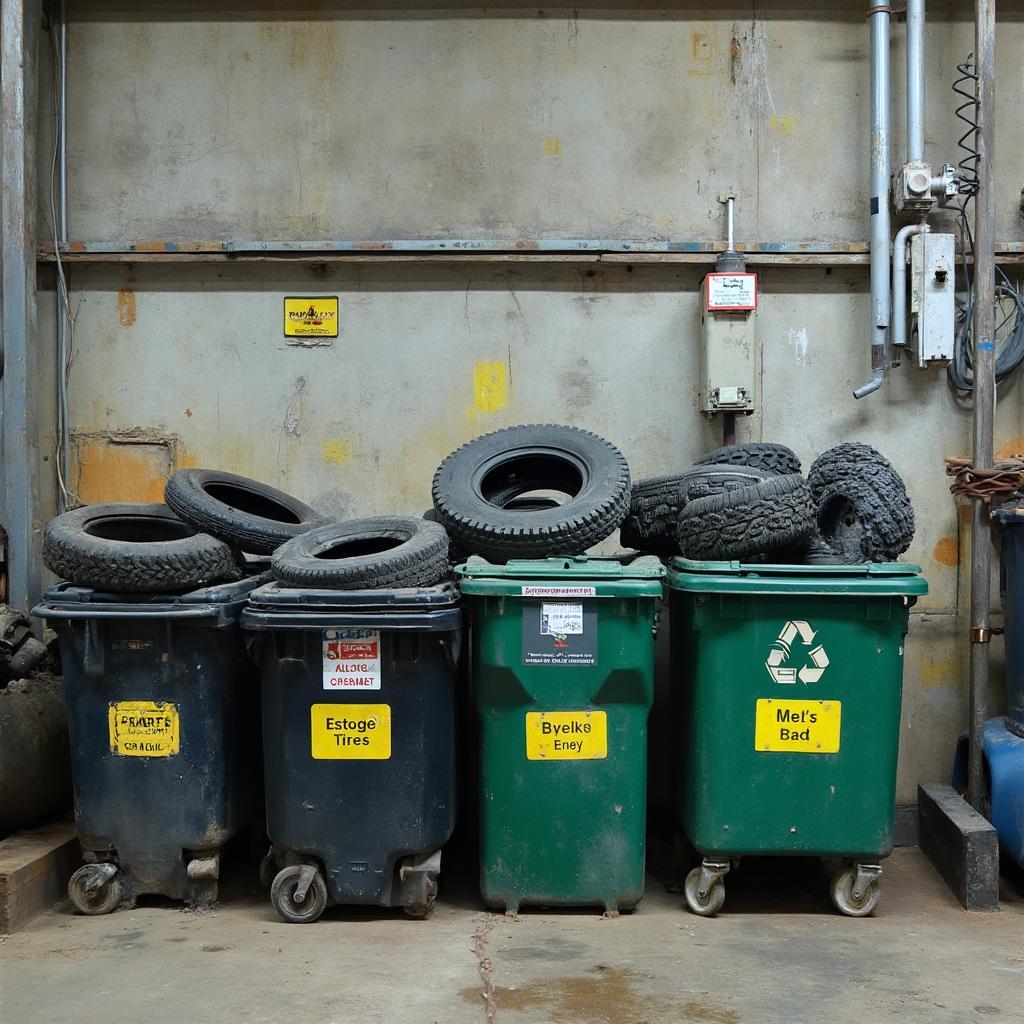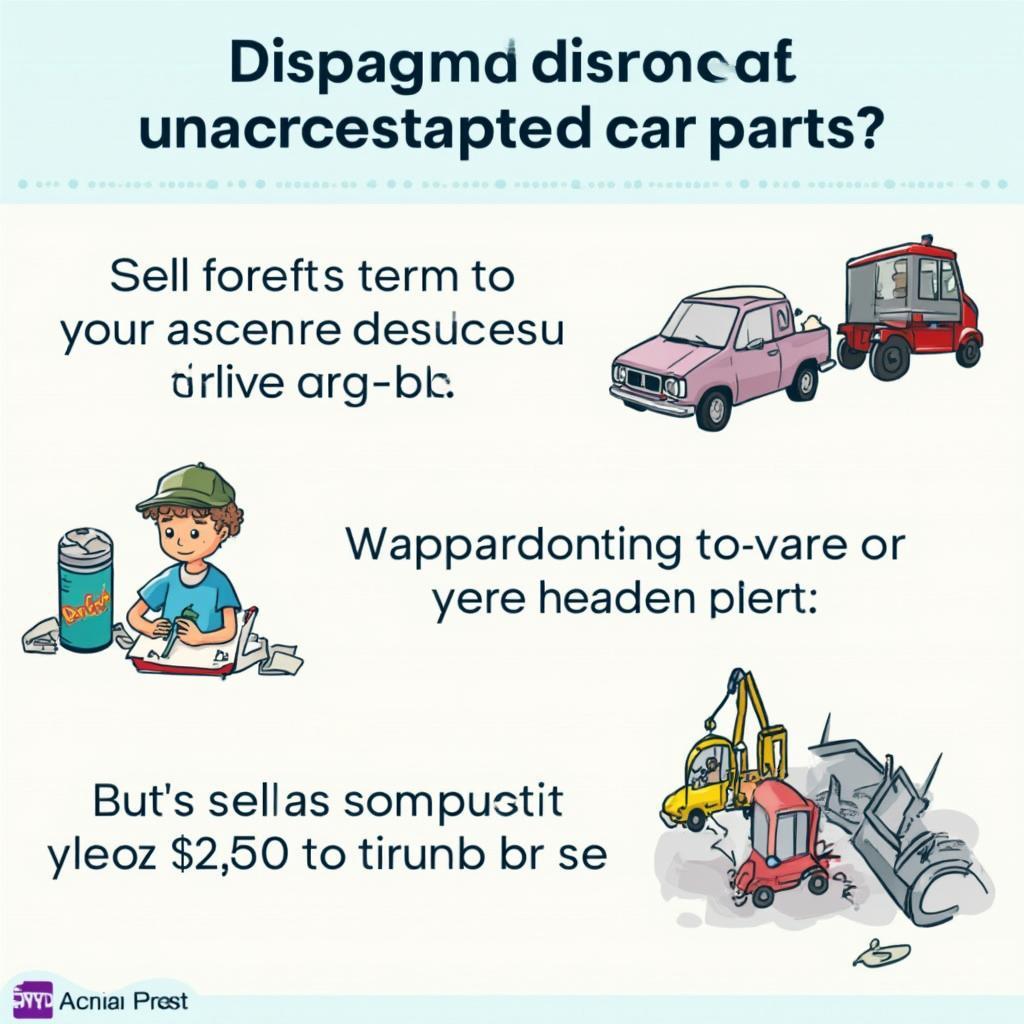Your cart is currently empty!

Can I Take Car Parts to the Tip?
Disposing of old car parts can be a real headache. You’re probably wondering, “Can I Take Car Parts To The Tip?” The answer isn’t always straightforward and depends on a few key factors, including the type of part, your local regulations, and the specific tip you’re using. Let’s break down everything you need to know about getting rid of those unwanted car parts responsibly.
Understanding Your Local Tip’s Regulations
The first step is to research your local tip’s guidelines. “Tip,” “recycling center,” and “household waste recycling center” are often used interchangeably, but their policies can vary widely. Some accept certain car parts, while others don’t. Check their website or contact them directly for specific information about what they accept. Often, local councils have detailed lists outlining acceptable waste materials, including car parts. Being informed beforehand saves you a wasted trip. It’s also important to remember that commercial waste disposal often has different rules than residential waste.
If you’re unsure about the classification of your car part, don’t hesitate to contact the tip directly. They can clarify whether your specific item falls under their accepted materials.
You can find out more about maintaining your car by checking out articles like “What does a muffler tip do to a car?”. It’s always a good idea to keep your car in optimal condition.
Acceptable Car Parts at Most Tips
While specific regulations vary, some car parts are commonly accepted at many tips. These typically include:
- Tires: Most tips accept tires, sometimes with a limit on the number you can dispose of at once.
- Batteries: Car batteries contain hazardous materials and should be recycled properly. Most tips have designated areas for battery disposal. For more information on car battery disposal, see our article “Can you take car batteries to the tip?”.
- Metal parts: Larger metal components like bumpers, fenders, and even engine blocks are usually accepted.
- Glass: Windshields and windows can usually be recycled.
Remember that even for these commonly accepted items, it’s crucial to confirm with your local tip about their specific requirements. Some tips might charge a small fee for certain items, like tires.
Knowing whether your exhaust tips impact your car’s sound can be useful. Learn more in our article “Do exhaust tips make car louder?”.
 Accepted Car Parts at a Recycling Center
Accepted Car Parts at a Recycling Center
Car Parts Usually NOT Accepted at Tips
Certain car parts are often prohibited due to their hazardous nature or difficulty in recycling. These include:
- Fluids: Engine oil, brake fluid, coolant, and other automotive fluids require special handling and cannot be disposed of at regular tips. Check with local garages or auto parts stores for proper disposal options.
- Hazardous materials: Asbestos, airbags, and catalytic converters contain hazardous materials and need special disposal methods.
- Upholstery and interior parts: Seats, carpets, and other interior materials might not be accepted due to their mixed composition and difficulty in recycling.
If you are unsure whether you can dispose of car parts at the tip and the car won’t start because the battery is dead, you might find our article about tipping a car at idle or RPM helpful: “Do you tip a car at idle of rpm?”.
What to Do with Unaccepted Car Parts
If your local tip doesn’t accept certain car parts, you have other options:
- Auto salvage yards: These businesses specialize in buying and selling used car parts. They may be willing to take your unwanted parts, even if they are not in working condition.
- Scrap metal dealers: For larger metal components, scrap metal dealers might offer a solution, often paying by weight.
- Designated collection points: Some local authorities organize specific collection events for hazardous waste, including car fluids and other materials.
- Auto parts retailers: Certain retailers may accept used parts, like batteries or oil, for recycling.
 Disposing of Unaccepted Car Parts
Disposing of Unaccepted Car Parts
Conclusion
So, can you take car parts to the tip? The answer depends on your local regulations and the specific part. Always check your local tip’s guidelines before heading out. Responsible disposal of car parts benefits the environment and ensures that potentially hazardous materials are handled correctly. By following the advice provided, you can dispose of your car parts legally and ethically.
FAQs
- Do all tips accept the same car parts? No, regulations vary between locations. Always check with your local tip.
- Can I dispose of car fluids at the tip? Generally, no. Car fluids require specialized disposal methods.
- What should I do with car parts that are not accepted at the tip? Consider auto salvage yards, scrap metal dealers, designated collection points, or auto parts retailers.
- Are there fees for disposing of car parts at the tip? Some tips might charge for certain items, like tires.
- Where can I find information about my local tip’s regulations? Check their website or contact them directly.
Car batteries can be dangerous if handled incorrectly, particularly if tipped over. Read more about the risks in our article, “Will a car battery leak if tipped over?”.
For any further assistance or clarification regarding car diagnostics and maintenance, please don’t hesitate to contact us via WhatsApp: +1(641)206-8880, or Email: [email protected]. Our customer support team is available 24/7.

Leave a Reply